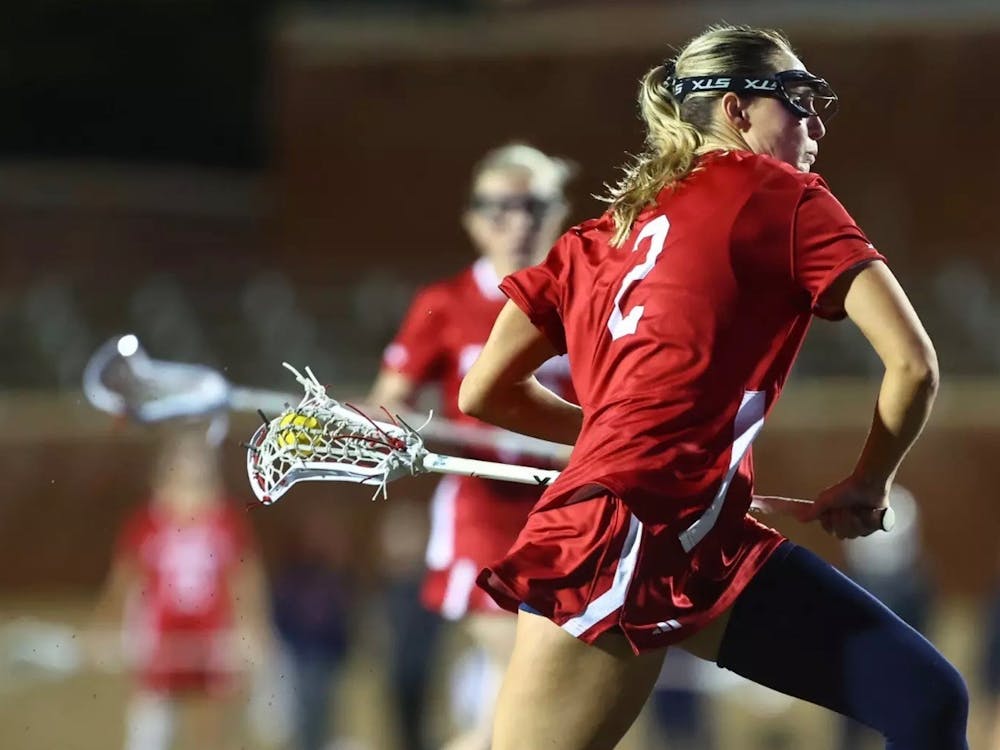As the people of this nation continue to grapple with living in a diverse society that has historically discriminated against racial and ethnic minorities, women, and LGBTQ+ people, the University of Richmond campus reflects this national climate. In this five-part series, The Collegian seeks to tell a few of the stories of non-majority students. These stories are by no means the only ones that need to be told, nor do they represent the experiences of all historically marginalized groups on campus.
Jarmal Bevels first encountered racism at 16. His high school girlfriend was white, and her parents didn’t like that she wanted to date a black boy.
So when Bevels, a senior wide receiver on the University of Richmond’s football team, was turned away from a fraternity lodge party on March 25, 2017, he said he wasn’t surprised. Instead, Bevels stood by, unfazed, as his white teammates were allowed into the same lodge even though a fraternity member at the front table had told Bevels he couldn’t enter because he was a football player.
“They let in a freshman football player who was white,” Bevels said. “We saw him walk in.”
After Bevels and his friends witnessed this, they argued briefly with the fraternity members at the white fold-out table in front of the building’s entrance. Then they “left in disappointment and frustration and had to find something else to do for the night,” Deontez Thompson, Bevels’ friend and teammate, said in an email interview.
A white alumnus of the UR fraternity was there that night. He said this had not been an isolated incident during his four years at UR.
“Students of color are not treated equally at the check-in desk to a lodge, but the reasons for that [are] about all of the ways students interact in every other facet of campus,” he said. “And all of that intersects at the check-in desk.”
If a student causes an issue at a fraternity, a fraternity can decide no one from that group is allowed back to the lodge, Meg Pevarski, assistant director of Greek Life, said.
“Our largest groups tend to be our Greek organizations and our athletic teams, and so over the last five years there have certainly been issues that have popped,” Pevarski said, adding that the fraternity should explain the reason why someone isn’t let in.
The alum’s fraternity had enacted a “no football players” rule after a white first-year football player had to be taken out of a lodge by the police, he said.
“We have, as a fraternity, an institutional mandate to not let football players in because all of the violence in our past has been caused by football players,” he said. “Ironically, those have all been caused by white football players.”
The level of the institution of this type of policy varies across chapters and isn't a formal process, Guillaume Diaz, Inter-fraternity Council president, said. “Things like that only come up when it’s a repeated thing and it’s not just one individual,” he said.
Enjoy what you're reading?
Signup for our newsletter
Bevels said what happened that night was racial profiling. Thompson agreed.
“My two years here so far, I have not encountered anything in terms of racism until [then],” Thompson said.
IFC members know about this perception and are considering changes, Diaz said.
“People do feel excluded and they feel they’re being excluded based on things they can’t control and that’s the opposite of what lodges are all about," Diaz said, adding that although he finds this “indicative of greater problems, [the incidents] are relatively isolated."
For the fraternity member, even though the original policy of “no football players allowed” might not have had a racist intent, the execution of it did, he said.
“It’s not that different than the rest of institutional racism,” he said. “You try to make a policy that makes sense, but your implicit bias causes you to interpret that policy in favor of white people.”
Cherelle Cotton, a junior, saw Bevels and Thompson be turned away.
“I don’t really go to lodges or anything like that, and when I do go out, I go to places that would like to have me there so I can feel comfortable and have a good time in a fun environment and a safe environment,” Cotton said. “This just felt hostile.”
UR’s student demographics and stereotypes are well-known, Bevels said. Most men of color on campus are athletes, so the fraternity members weren’t far off in their assumption that Bevels and Thompson were athletes and their white teammates weren’t, he said.
“Either you play a sport or you’re a small percentage of the campus,” Bevels said of being a man of color at UR.
Six percent of all students identify as black or African-American, according to UR's student diversity profile for the fall of 2017.
When Bevels was a freshman, the older football players warned him not to go to certain fraternities, Bevels said.
“Me and my teammates don’t really go to lodges that often,” Bevels said. “Since my freshman year, I’ve probably gotten into two lodges.”
So when he and his friends do go out, they make a plan to increase their odds of being allowed in.
“We’ll go early, we’ll go in a small group, we’ll wear what we’re supposed to wear,” Bevels said.
But it rarely works.
“It’s surprising when it doesn’t happen,” Bevels said. “If they let us into a lodge, we’re like, ‘hurry, let’s get in here before they tell us to leave.’”
For Cotton, this doesn’t reflect a larger trend on campus, but it is a problem she and other students of color encounter in UR’s social scene.
“I’m not going to say the whole campus is racist and they hate black people,” Cotton said. “But there are people who are like that, and they ruin those experiences when they show up and when we show up.”
Bevels said what frustrated him most was being excluded on his own campus.
“You have to use your student ID to get in [to the lodge],” he said. “We’re really upset about how the campus allows it.”
Even though the lodge may be on UR property, a housing corporation or an alumnus signs to lease a lodge on behalf of each chapter, which also must have insurance, Pevarski said. This gives the individual fraternity control over the events in the space it leases. As a result, the university and each chapter's advising board or adviser from the national organization tells chapters “about how liable we are for everything we do,” Diaz said.
“It bothers me because I too appreciate that [lodges] are spaces where people from all different areas and walks from campus can come together,” Pevarski said of the fraternity's actions.
Students use university identification to swipe into the lodge to “manage risk and to be able to manage who is actually at a social event,” Pevarski said. In addition, UR requires a verified list of who attends lodges for time-stamped logs that can be used by law enforcement if needed, Pevarski said.
But new leadership and new members in charge of the admission tables at lodges can lead to confusion, Pevarski said.
“I can imagine that it gets botched more often than it doesn’t,” Pevarski said.
This leads Pevarski to two fundamental questions about social life at UR.
“Are we doing enough as a campus to provide additional social scenes where other people feel like they can own them?” Pevarski said. “As the university continues to diversify and grow, is what we’re doing serving the student population in the way that we want it to?”
For the fraternity member, this also represents a much larger social issue on campus.
“We’re a diverse campus, but we’re still segregated,” the fraternity member said. “We rarely make friends across racial, ethnic, religious boundaries, and when we do, it’s not a large group of people.”
After the players weren’t allowed into the lodge, it became an ordeal for the whole football team that night and the next day, Bevels said. Players talked about reporting the incident to the school but eventually decided it wouldn’t be worth it.
“We felt like it was just going to be a waste of breath,” Bevels said. “Because this is not only the culture at school here, it’s the culture everywhere.”
This is the first installment of a five-part series, to be published one per day this week.
Contact editor-in-chief Claire Comey at claire.comey@richmond.edu.
Support independent student media
You can make a tax-deductible donation by clicking the button below, which takes you to our secure PayPal account. The page is set up to receive contributions in whatever amount you designate. We look forward to using the money we raise to further our mission of providing honest and accurate information to students, faculty, staff, alumni and others in the general public.
Donate Now



